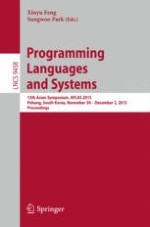This book constitutes the refereed proceedings of the 13th Asian Symposium on Programming Languages and Systems, APLAS 2015, held in Pohang, South Korea, in November/December 2015. The 24 regular papers presented together with 1 short paper were carefully reviewed and selected from 74 submissions. The papers cover a variety of foundational and practical issues in programming languages and systems and have been organized in topical sections on compilers, separation logic, static analysis and abstract interpretation, Hoare logic and types, functional programming and semantics, model checking, program analysis, medley, and programming models.
